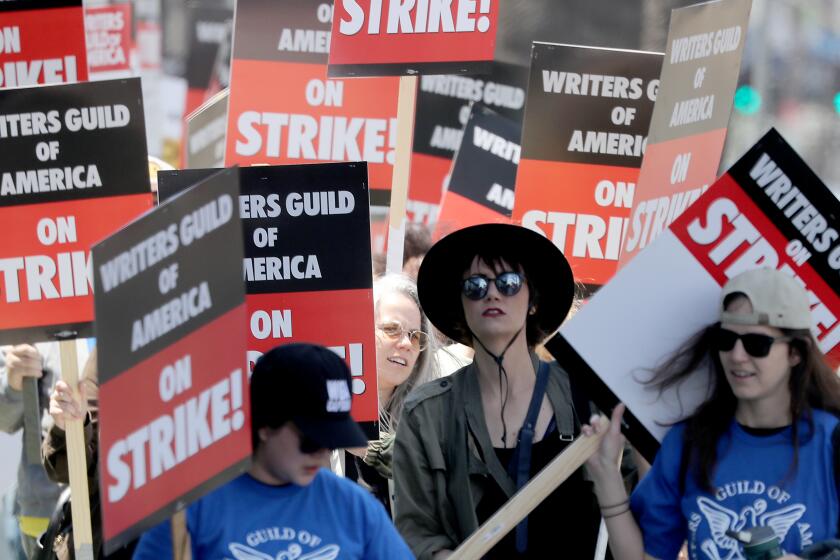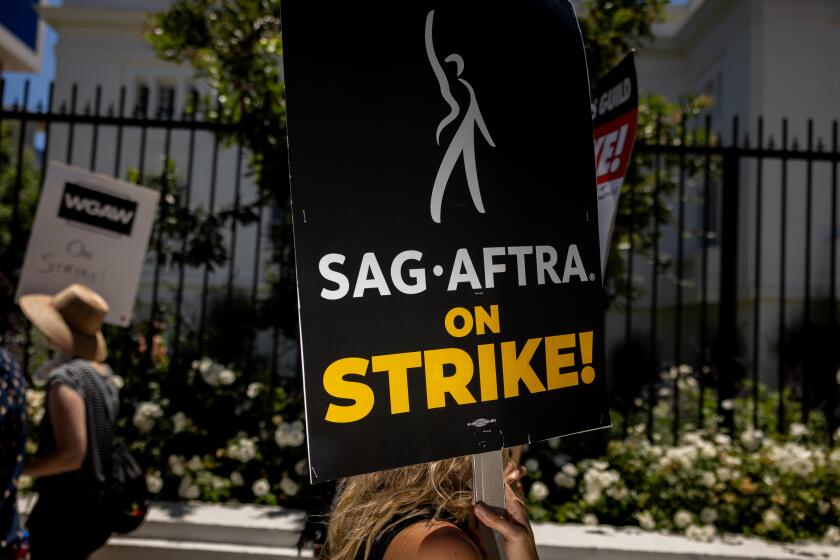
A strange creature, the Hollywood award in strike season.
The show is going on, sort of: Audiences, critics and voters are still watching the award-worthy work even as the award-worthy creators refuse to make more of it. The for-your-consideration campaigns and journalistic access-grubbing lurch forward awkwardly even as ceremonies get pushed back. The screenwriters and actors remain proud of the work theyâve done, unproud of how theyâve been compensated to do it recently, and in the running to win all the same.
This year, while contemplating navigating the bramble of union strike rules about whatâs promotable during Hollywoodâs dual writer-actor stoppages, the longtime Humanitas Prizes for screenwriters encountered an additional complication. The hotel it has recently used for the ceremony, the Beverly Hilton, has been targeted for strike by the hospitality workers of Unite Here Local 11.
The Humanitas nonprofit, which is run by and for writers, and which annually âhonors and empowers film and television writers whose work explores the human condition in a nuanced, meaningful way,â was not about to risk crossing a picket line. But how was the organization going to give out the organizationâs $10,000-per-award cash prizes to striking winners who probably could use the money?
The labor-friendly answer: Skip the usual hotel ceremony, give out the award money anyway and let the newspaper announce the winners.
âWeâre here to champion and empower writers, but specifically writers working on stories that arenât necessarily courted by the marketplace,â said Humanitas executive director Michelle Franke. This year, with writers out of work and marching on the studios, âItâs less important to us this year what presentation of those awards look like.â
Pointedly, the organization is giving its annual Voice for Change award, created âto celebrate those who take risks and stand up for ideals that benefit society,â to the Writers Guild of America, which recently passed the 100-day mark on the picket lines.
âThereâs a certain fearful symmetry there that an organization that honors the dignity of humanity, the importance of human rights, the importance of creative storytelling, is honoring us at a time when our storytelling and creativity is being threatened by artificial intelligence,â said Writers Guild of America East President Michael Winship.
âThis is really an honor, because I think the guild really deserves it,â said Writers Guild of America West President Meredith Stiehm. âThereâs a lot of courage in these people, people in staff and in leadership. Thatâs how you get change.â
The 2023 writersâ strike is over after the Writers Guild of America and the Alliance of Motion Picture and Television Producers reached a deal.
The Humanitas Prizes are not one of Hollywoodâs headliner awards â they arenât televised â but theyâre respected in the screenwriting community and have been retooling to meet the needs of the modern era while staying true to the organizationâs unique humanist roots.
Lest the Latin branding send the wrong signal, todayâs Humanitas is avowedly secular and has no connection to the Catholic Church. But the awards were founded in 1974 by the most peculiar sort of hyphenate: a 6-foot-7 priest-producer named Father Ellwood âBudâ Kieser of the churchâs Paulist Fathers society.
Kieser, who died in 2000, believed âwe become fulfilled persons through a long and arduous process of humanizationâ and thought TV could teach us all how to love. Kieser also enjoyed show business, had famous friends and was no stranger to the power breakfast. While swimming in the Pacific Ocean one day, he came up with the idea for a screenwriting prize âto elevate the moral tone of the creationsâ (scripts) âof the most significant componentâ (screenwriters) âof the most significant industryâ (Hollywood) âin the United States,â Kieser wrote in his autobiography, âHollywood Priest.â
The decision to nudge writers in particular to produce more thoughtful work wasnât an accident, according to Kieser. In the beginning was the Word, after all.
With a seed donation of $10,000 from the Lilly Foundation, Kieser incorporated Humanitas in L.A. County âto increase public awareness of the insights of the Judaic-Christian visionâ in the media, ditching an early idea to name the awards after Mahatma Gandhi. (Kieser himself initially thought the name Humanitas sounded too Catholic for the broader vision he was pursuing.) Kieser became known as a bit of an interfaith arm-twister when it came to pestering Hollywood talent to participate. âThereâs a story that goes around that the thing that makes [the Humanitas Prizes succeed] is the Irish and Jewish capacity for guilt and my Teutonic insensitivity to inflict it,â Kieser said later.
In Humanitasâ earlier years, Kieserâs influence gave the organization a unique flair in the broader Hollywood landscape. âAwards, theyâre really invented by the Spanx industry, because thereâs no way to fit into any outfit you actually want to be photographed in,â said Amy Sherman-Palladino, showrunner of Amazonâs âThe Marvelous Mrs. Maisel.â
Sherman-Palladinoâs first encounter with Humanitas, when she was nominated for a prize for writing on the 1990s sitcom âRoseanne,â was different. âThey had a panel or some sort of gathering after the awards to talk to a group of young writers, aspiring writers or something,â said Sherman-Palladino. âIt was us, a folding table, a priest, in a not huge room. It is interesting to see what it developed into, because itâs a little fancy.â
At more recent awards banquets, nominees might still have seen âone or two nuns walking aroundâ who have been part of Humanitas for a long time, said current board president Jenny Bicks, showrunner of Foxâs âWelcome to Flatch.â But in the decades since Kieserâs death, the organization has âevolved,â Bicks said: âWe never see it as a religious organization. We know it was founded by Father Bud, but we donât approach any of these scenarios by looking at what happened in the Bible. Weâre just celebrating stories. By the way, the Bible had some great stories.â
What makes a script Humanitas-worthy can seem a little vague, though a Humanitas awards guide on âThe Art of Screenwritingâ offers criteria including technical structure like plotting and dialogue as well as themes on the âhuman condition,â defined as âall of the characteristics and key events that compose the essentials of human existence, including birth, growth, emotion, aspiration, conflict, and mortality.â
SAG-AFTRA has approved a deal from the studios to end its historic strike. The actors were on strike for more than 100 days.
Guillermo del Toro and Patrick McHale won this yearâs Humanitas prize for family feature film for writing âGuillermo del Toroâs Pinocchio,â a reworking of the classic folk tale about a toy that comes to life. âItâs amazing, especially this sort of award, where it feels like it has more meaning,â said McHale. The pairâs unique take focuses less on Pinocchioâs journey to become a real boy than Geppettoâs journey to become a father.
âThis and âFrankensteinâ have been sort of pillars for me since I was a kid, you know? I think they are very similar stories, at least two sides of a coin, and they both deal with children that are left astray to find out the meaning of the world and what it is to be human, through their own devices,â said Del Toro, who was educated in Jesuit schools. âHaving been raised as a Catholic, both stories have immense resonance with fundamental questions â what is it that makes us human, what is the condition that makes life precious â and the imagery in both movies and both stories is really pregnant with Catholic undertones and meanings.â
Other Humanitas winners tell less socially traditional stories.
Craig Mazin won the drama teleplay prize for the âLong, Long Timeâ episode of HBOâs âThe Last of Us,â about two gay men who fall in love during a pandemic that kills most of the planetâs population. âThis episode was one that very much came from a personal place,â Mazin said. âSometimes people will ask me, âExactly how is that? Youâre not a gay man.â My response is: âCorrect, but I am a middle-aged person who is in a committed relationship, and has been for a long, long time.â ... Writing, by definition, is an exercise in writing about people who are not yourself.â
Sherman-Palladino won the Humanitas Prize this year for comedy teleplay for the series finale of âThe Marvelous Mrs. Maisel,â which completes the story of comedian Miriam âMidgeâ Maiselâs lifelong friendship with talent manager Susie Myerson â a different sort of love story. âShow business can be lonely and can be wonderful, but at the end of the day, in a sense they both ended up alone, but both ended up with each other, the most important person in their life,â Sherman-Palladino said. âIt wasnât a husband or a girlfriend or a wife. It was a friendship, a bond between these two women, a not-that-hidden heartbeat of the whole show.â
Ondi Timoner won the documentary prize for âLast Flight Home,â about her terminally ill fatherâs decision in 2021 to exercise Californiaâs End of Life Option Act to die by lethal medication, which comes with a 15-day waiting period. She had started filming her fatherâs final days as a way to fight against her fear that she would forget him; while shooting, she realized the film should be a documentary.
Timoner is working on her next project about a hospice for people who are homeless called the Inn Between. âI got one grant for âThe Inn Between,â and weâre pretty much out of money. Iâm going out of pocket right now,â Timoner said, adding that sheâs also been invited to speak to schools and legislatures around the world about aid-in-dying legislation. âThis [award] money will go directly to what weâre doing right now.â
Humanitasâ projects go beyond awards. This fall, with support from the Muriel Pollia Foundation, Humanitas is going to introduce a TV writing workshop for high school students called the Writers Room.
The organization also has delivered more than 1,200 grocery cards to Writers Guild of America members around the U.S. to help tide them through the strike.
âWeâre trying on a bunch of levels to be there for writers, not just for handing out an award once a year, but all of our other programs,â Bicks said. âWe canât employ writers, but we can certainly reward them and educate them and keep them fed.â
âWe are simply celebrating writing, and during the writersâ strike, thatâs something I donât want to forget about it,â said David Shore, creator of âHouse,â showrunner of ABCâs âThe Good Doctorâ and a Humanitas board member who also sits on the Writers Guildâs negotiating committee. âThe whole point of the strike is that writing is paramount.â
In lieu of a hotel ceremony, Humanitas is set to hold an awards party Nov. 2 at the Avalon in Hollywood.
The nominees and winners of this yearâs other Humanitas Prizes can be seen here.
More to Read
The biggest entertainment stories
Get our big stories about Hollywood, film, television, music, arts, culture and more right in your inbox as soon as they publish.
You may occasionally receive promotional content from the Los Angeles Times.













